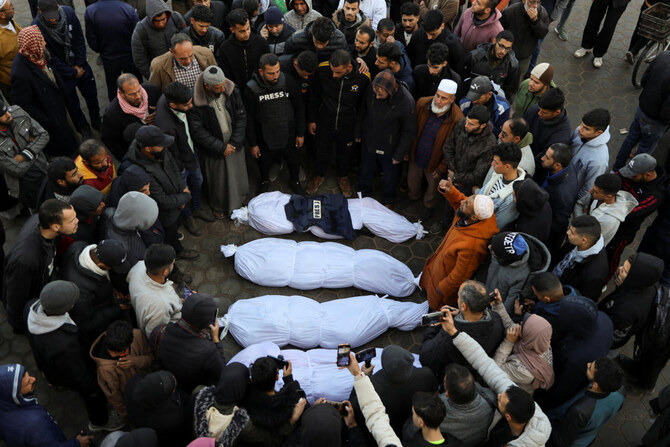ANKARA: In a bipartisan letter penned by 170 members of the US Congress to Secretary of State Antony Blinken, American lawmakers have urged President Joe Biden’s administration to consider the “troubling human rights abuses” in Turkey.
“President Recep Tayyip Erdogan and his Justice and Development Party have used their nearly two decades in power to weaken Turkey’s judiciary, install political allies in key military and intelligence positions, crack down on free speech and (the) free press,” the letter said.
Dated Feb. 26 but made public on March 1, the letter asks Washington to formulate its policy regarding Turkey considering human rights, saying that the Erdogan administration has strained the bilateral relationship.
“Strategic issues have rightfully received significant attention in our bilateral relationship, but the gross violation of human rights and democratic backsliding taking place in Turkey are also of significant concern,” the letter said, making a specific reference to the May 2017 assault on peaceful protesters and federal employees by Turkish security forces during Erdogan’s visit to Washington.
The letter’s timing coincides with the common declaration of Human Rights Watch, the International Commission of Jurists, and the Turkey Human Rights Litigation Support Project on Monday, criticizing the Turkish government’s failure to comply with a binding European Court of Human Rights (ECHR) order to release Turkish activist Osman Kavala.
The letter also came a day before Turkey announced a much-awaited reform plan that only included vague commitments to launch a “Human Rights Action Plan,” with no clarification about the situation of jailed activists and politicians.
Washington previously urged Ankara to respect the ECHR’s rulings to release Kurdish politician Selahattin Demirtas and Kavala.
Turkey’s politically-motivated judicial proceedings against opposition lawmakers, as well as the debates around the closure of the pro-Kurdish Peoples’ Democratic Party (HDP), have been on the radar for a long time.
Indeed, just after the announcement of the “Human Rights Action Plan,” the Court of Cassation launched an investigation into the HDP and requested the summary of proceedings pertaining to its lawmakers — a strong sign that the government is in a rush to shut down the third largest party in the Turkish Parliament.
Ankara recently made some steps to improve relations with Washington, especially through an expensive lobbying campaign to bypass the deadlock over Turkey’s purchase of the Russian S-400 missile defense system that resulted in the removal of Turkey from the US F-35 fighter jet program.
“Within the bigger picture, promotion of democracy and human rights, as well as freedoms in Turkey, will for the first time be on the agenda of the US administration,” Soner Cagaptay, a Turkish academic from the Washington Institute for Near East Policy, told Arab News.
“Previously, US administrations usually paid lip service, making statements but always separating strategic ties from the democracy and human rights portfolio. But now it is not really possible,” he said.
According to Cagaptay, among American allies, together with Hungary, Turkey is the country suffering the most from democratic erosion and the curtailment of checks and balances, and for the Biden administration, strengthening democracy abroad has become a vital component for strengthening faith in the democratic process at home.
While managing differences and expanding areas of cooperation will also be other legs of Turkish-American relations in the new period, democracy will occupy the largest part, experts note.
“Congress is currently the most powerful focal point of anti-Turkish voices, especially after the purchase of the Russian missile defense system. CAATSA legislation, according to which Turkey was sanctioned for its S-400 acquisition, was written by Congress itself. Turkey is the first country to defy this legislation. Turkey is seen in Congress as the second most problematic country after Russia,” Cagaptay said.
Therefore, he added, even if the Biden administration were to reset with Turkey, it will be very hard for US-Turkish relations to gain a semblance of normality because, however the White House reaches out to Ankara, Congress will constantly check and temper it.
Jonathan Katz, a senior fellow at the German Marshall Fund of the United States, agrees.
“While not the only challenges on the agenda, human rights and democratic backsliding will definitely be an area of high-level focus with Turkish officials for the Biden administration and US Congress,” he told Arab News.
According to Katz, it is clear based on the two recent congressional letters in the Senate and House that there is a ramped-up effort to address what many see as Erdogan pushing Turkey closer toward being an autocracy, and away from being a stalwart NATO ally that shares a US and transatlantic security and political agenda.
“Turkey’s government carrying out and implementing new reforms would be seen as positive in Washington but there is deep suspicion that these efforts are ‘window dressing’ only meant to strengthen Erdogan politically,” he said.


























